最新人教版八年级下册英语全册知识点大全
- 格式:doc
- 大小:107.00 KB
- 文档页数:15

新人教版|八年级下册英语所有知识点大汇总!Unit1 what' s the matter?1. It’s +形容词+ for sb. + to do sth. 做某事对某人来说是…的。
It’s important to do sth. 做某事很重要。
It’s important for me to eat a balanced diet. 平衡饮食对我来说是很重要的.It’s easy to do sth. 做某事是容易的。
It’s easy for us to find out the answer. 找出答案对我们来说是容易的。
2. 情态动词should的用法should是情态动词,它的基本用法是必须和其他动词一起构成谓语。
意为"应该......"。
should(应当,应该)用于所有人称,表示劝告或建议。
eg. ---I have a very bad cold. 我感冒很厉害。
---You should lie down and have a rest. 你应该躺下,多喝水。
3. maybe与may be(1)maybe是副词,译为“也许、可能”,相当于“perhaps”。
如:Maybe he can answer the question. 也许他能回答那个问题。
He maybe is from the USA, too. 他可能也来自美国。
(2)may be中的may为情态动词,译为“可能是......”。
如:He may be from the USA, too. 他可能也来自美国。
She may be our English teacher. 她可能是我们的英语老师。
4. few、a few、little、a little的区别和联系:(1)few / a few用来修饰可数名词,few表示否定意义,没有,几乎没有;a few表示肯定意义,有几个。
例如:He has few friends here, he feels lonely. 他这里没朋友,他感觉寂寞。
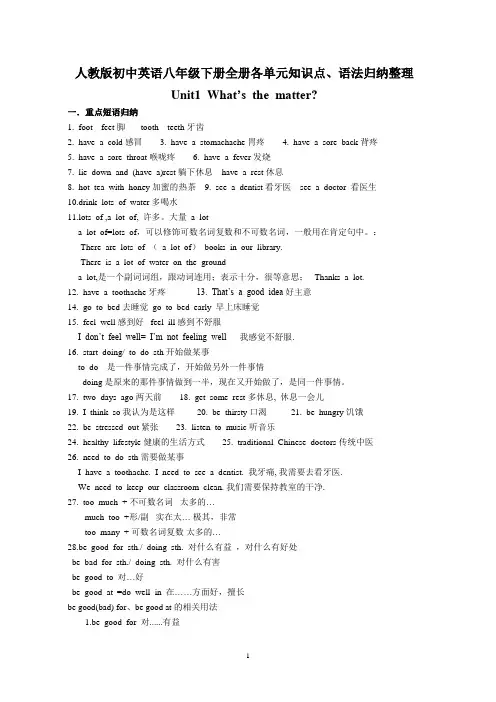
人教版初中英语八年级下册全册各单元知识点、语法归纳整理Unit1 W hat’s the matter?一.重点短语归纳1. foot---feet 脚tooth---teeth 牙齿2. have a cold 感冒3. have a stomachache 胃疼4. have a sore back背疼5. have a sore throat喉咙疼6. have a fever发烧7. lie down and (have a)rest 躺下休息have a rest 休息8. hot tea with honey 加蜜的热茶9. see a dentist 看牙医see a doctor 看医生10.drink lots of water多喝水11.lots of ,a lot of, 许多。
大量a lota lot of=lots of,可以修饰可数名词复数和不可数名词,一般用在肯定句中。
:There are lots of (a lot of)books in our library.There is a lot of water on the grounda lot,是一个副词词组,跟动词连用;表示十分,很等意思;Thanks a lot.12. have a toothache牙疼13. That’s a good idea好主意14. go to bed 去睡觉go to bed early 早上床睡觉15. feel well感到好 feel ill 感到不舒服I don’t feel well= I’m not feeling well我感觉不舒服.16. start doing/ to do sth开始做某事to do 是一件事情完成了,开始做另外一件事情doing是原来的那件事情做到一半,现在又开始做了,是同一件事情。
17. two days ago两天前18. get some rest 多休息, 休息一会儿19. I think so我认为是这样20. be thirsty口渴21. be hungry 饥饿22. be stressed out紧张23. listen to music听音乐24. healthy lifestyle健康的生活方式25. traditional Chinese doctors传统中医26. need to do sth 需要做某事I have a toothache. I need to see a dentist. 我牙痛, 我需要去看牙医.We need to keep our classroom clean. 我们需要保持教室的干净.27. too much + 不可数名词太多的…much too +形/副实在太…极其,非常too many + 可数名词复数太多的…28.be good for sth./ doing sth. 对什么有益,对什么有好处be bad for sth./ doing sth. 对什么有害be good to 对…好be good at =do well in 在……方面好,擅长be good(bad) for、be good at的相关用法1.be good for 对......有益Doing morning exercises is good for your health.做早操对你们的建康有益。
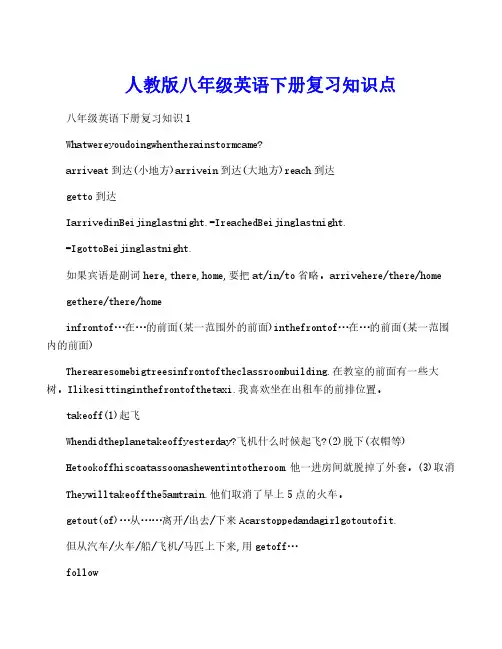
人教版八年级英语下册复习知识点八年级英语下册复习知识1Whatwereyoudoingwhentherainstormcame?arriveat到达(小地方)arrivein到达(大地方)reach到达getto到达IarrivedinBeijinglastnight.=IreachedBeijinglastnight.=IgottoBeijinglastnight.如果宾语是副词here,there,home,要把at/in/to省略。
arrivehere/there/homegethere/there/homeinfrontof…在…的前面(某一范围外的前面)inthefrontof…在…的前面(某一范围内的前面)Therearesomebigtreesinfrontoftheclassroombuilding.在教室的前面有一些大树。
Ilikesittinginthefrontofthetaxi.我喜欢坐在出租车的前排位置。
takeoff(1)起飞Whendidtheplanetakeoffyesterday?飞机什么时候起飞?(2)脱下(衣帽等)Hetookoffhiscoatassoonashewentintotheroom.他一进房间就脱掉了外套。
(3)取消Theywilltakeoffthe5amtrain.他们取消了早上5点的火车。
getout(of)…从……离开/出去/下来Acarstoppedandagirlgotoutofit.但从汽车/火车/船/飞机/马匹上下来,用getoff…follow跟随Ifollowedhimuphehill.我跟着他上了山.沿着……前进Followthisroaduntilyougettothepostoffice.顺着这条路一直到邮局.(3)听懂,理解Couldyouspeakmoreslowly?Ican’tfollowyou.你能说慢点吗?我听不(4)followsb.todosth.跟着某人做某事Pleasefollowmetoreadthestory.请跟我读这个。

八年级下册人教版英语笔记一、Unit 1 What's the matter?1. 重点单词。
- matter:n. 问题;事情。
常用搭配:What's the matter (with sb.)? = What's wrong (with sb.)? = What's the trouble (with sb.)?(某人)怎么了?- sore:adj. 疼痛的;酸痛的。
例如:a sore throat喉咙痛。
- stomachache:n. 胃痛;腹痛。
- foot:n. 脚;足。
复数形式是feet。
- neck:n. 脖子;颈部。
- fever:n. 发烧。
have a fever发烧。
- lie:v. (lay - lain)躺;平躺。
lie down躺下。
- rest:v. & n. 放松;休息。
take breaks/take a break = have a rest休息。
- cough:v. & n. 咳嗽。
have a cough咳嗽。
- toothache:n. 牙痛。
2. 重点短语。
- have a cold:感冒。
- have a stomachache:胃痛。
- lie down and rest:躺下休息。
- drink some hot tea with honey:喝些加蜂蜜的热茶。
- see a dentist:看牙医。
- get an X - ray:拍X光片。
- take one's temperature:量体温。
3. 重点句型。
- What should I do? 我应该做什么?- You should see a dentist and get an X - ray. 你应该去看牙医并拍X光片。
- Should I put some medicine on it? 我应该在上面敷些药吗?- Yes, you should. / No, you shouldn't. 是的,你应该。
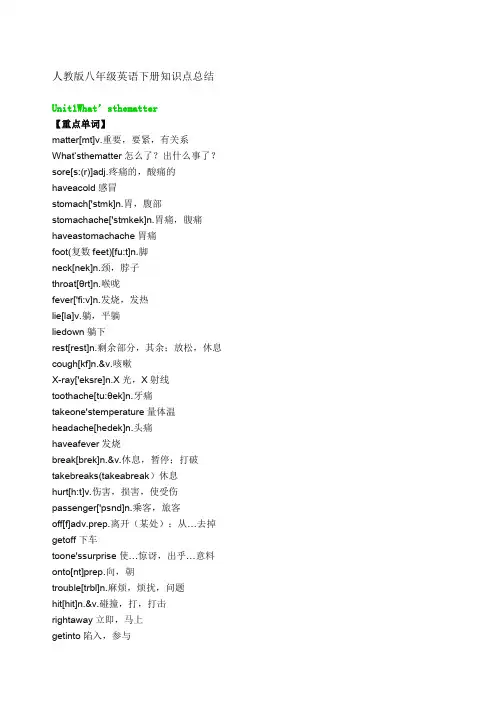
人教版八年级英语下册知识点总结Unit1What’sthematter【重点单词】matter[mt]v.重要,要紧,有关系What’sthematter怎么了?出什么事了?sore[s:(r)]adj.疼痛的,酸痛的haveacold感冒stomach['stmk]n.胃,腹部stomachache['stmkek]n.胃痛,腹痛haveastomachache胃痛foot(复数feet)[fu:t]n.脚neck[nek]n.颈,脖子throat[θrt]n.喉咙fever['fi:v]n.发烧,发热lie[la]v.躺,平躺liedown躺下rest[rest]n.剩余部分,其余;放松,休息cough[kf]n.&v.咳嗽X-ray['eksre]n.X光,X射线toothache[tu:θek]n.牙痛takeone'stemperature量体温headache[hedek]n.头痛haveafever发烧break[brek]n.&v.休息,暂停;打破takebreaks(takeabreak)休息hurt[h:t]v.伤害,损害,使受伤passenger['psnd]n.乘客,旅客off[f]adv.prep.离开(某处);从…去掉getoff下车toone'ssurprise使…惊讶,出乎…意料onto[nt]prep.向,朝trouble[trbl]n.麻烦,烦扰,问题hit[hit]n.&v.碰撞,打,打击rightaway立即,马上getinto陷入,参与herself[h:self]pron.她自己,她本身(she的反身代词)bandage['bndd]n.&v.绷带;用绷带包扎sick[sk]adj.患病的,不适的knee[ni:]n.膝盖nosebleed[nzbli:d]n.鼻出血breathe[bri:e]v.呼吸sunburned[snb:nd]adj.晒伤的ourselves[ɑ:selvz]pron.我们自己(we的反身代词)climber[klam(r)]n.登山者beusedto习惯于…适应于…risk[rsk]n.&v.风险,危险;冒险takerisks(takearisk)冒险accident[ksidnt]n.意外事件;事故situation[sitjuein]n.状况,形式,情况kg=kilogram[klgrm]n.公斤,千克rock[rk]n.岩石runout(of)用尽,耗尽knife[naif]n.刀,餐刀cutoff切除blood[bld]n.血mean[mi:n]v.意味着,意思是,意欲getoutof离开,从…出来importance[mp:tns]n.重要性decision[d'sn]n.决心,决定,抉择control[kn'trl]v.控制,支配,操纵beincontrolof掌管,管理spirit['sprt]n.勇气,意志death[deθ]n.死亡giveup放弃nurse[n:s]n.护士【重点短语】1.haveafever发烧2.haveacough咳嗽3.haveatoothache牙疼4.talktoomuch说得太多5.drinkenoughwater喝足够的水6.haveacold受凉;感冒7.haveastomachache胃疼8.haveasoreback背疼9.haveasorethroat喉咙痛10.takerisks冒险11.hotteawithhoney加蜂蜜的热茶12.seeadentist看牙医13.getanX-ray拍X光片14.takeone’stemperature量体温15.putsomemedicineonsth.在……上面敷药16.giveup放弃17.soundlike听起来像18.allweekend整个周末19.inthesameway以同样的方式20.gotoadoctor看医生21.goalong沿着……走22.onthesideoftheroad在马路边23.shoutforhelp大声呼救24.withoutthinkingtwice没有多想25.getoff下车26.haveaheartproblem有心脏病27.toone’ssurprise另某人惊讶的是28.thanksto多亏了;由于29.intime及时30.makeadecision做出决定31.getintotrouble造成麻烦32.rightaway立刻;马上33.becauseof由于34.getoutof离开;从……出来35.keepondoingsth.继续或坚持做某事36.putabandageonsth.用绷带包扎37.falldown摔倒38.feelsick感到恶心39.haveanosebleed流鼻血40.cuthisknee割伤他的膝盖41.putherheadback把她的头向后仰42.haveproblemsbreathing呼吸困难43.mountainclimbing登山运动44.beusedtodoingsth.习惯做某事45.runout(of)用完;用尽46.sothat以便47.so...that...如此……以至于...…48.beincontrolof掌管;管理49.inadifficultsituation在闲境中【重点句型】1.What'sthematterwithyou=What'thetroublewithyou=What'swrongwithyou你怎么了?2.Whatshouldshedo她该怎么办呢?3.ShouldItakemytemperature我应该量一下体温吗?4.Youshouldliedownandrest.你应该躺下休息一会儿。

最新人教版八年级下册英语全册知识点大全Unit 1重点短语:have a stomachache have a cold lie downtake one’s temperature have a fever go to a doctorto one’s surprise agree to (do sth.)get into troublebe used to take risks run out (of)cut off get out of be in control ofkeep on ( doing sth.)give up语言知识归纳:1. What’s the matter (w ith you)?此句用来询问别人的病情。
类似的句子还有:What’s wrong with you?/ What’s the trouble?matter作动词用,意为“要紧”“有关系”,主要用于疑问句和否定句。
What does it matter? It doesn’t matter.【例题】Does it ________ if we can’t finish it today?A. mindB. mindsC. matterD. matters2. I have a sore throat.have “患病”,常用“have a /an+ 名词”.have a cold have a fever have a sore backhave a stomachache have a cough【例题】( )---Does he often have ______ cold? ---Yes. He also _____a cough and a sore throat.A. a; hasB. /; hasC. a; haveD. /; have3.Lie down and rest! 躺下休息lie down 躺下4.That’s probably why. 那可能就是原因。
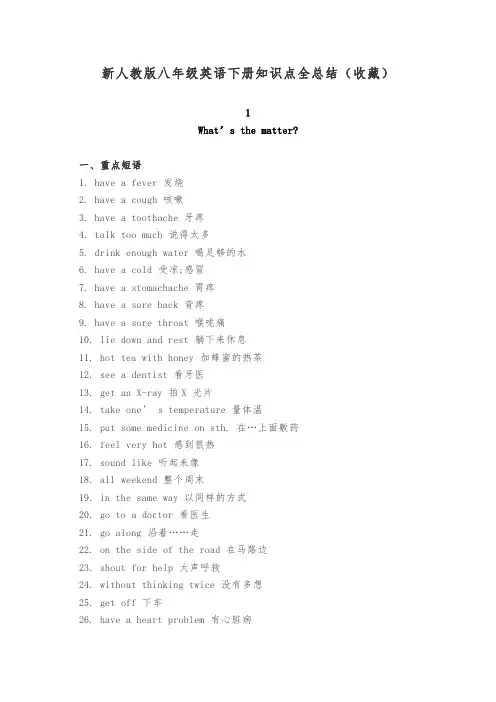
新人教版八年级英语下册知识点全总结(收藏)1What’s the matter?一、重点短语1.have a fever发烧2.have a cough咳嗽3.have a toothache牙疼4.talk too much说得太多5.drink enough water喝足够的水6.have a cold受凉;感冒7.have a stomachache胃疼8.have a sore back背疼9.have a sore throat喉咙痛10.lie down and rest躺下来休息11.hot tea with honey加蜂蜜的热茶12.see a dentist看牙医13.get an X-ray拍X光片14.take one’s temperature量体温15.put some medicine on sth.在…上面敷药16.feel very hot感到很热17.sound like听起来像18.all weekend整个周末19.in the same way以同样的方式20.go to a doctor看医生21.go along沿着……走22.on the side of the road在马路边23.shout for help大声呼救24.without thinking twice没有多想25.get off下车26.have a heart problem有心脏病27.to one’s surprise使.......惊讶的28.thanks to多亏了;由于29.in time及时30.save a life挽救生命31.get into trouble造成麻烦32.right away立刻;马上33.because of由于34.get out of离开;从……出来35.hurt oneself受伤36.put a bandage on sth.用绷带包扎37.fall down摔倒38.feel sick感到恶心39.have a nosebleed流鼻血40.cut his knee割伤他的膝盖41.put her head back把她的头向后仰42.have problems breathing呼吸困难43.mountain climbing登山运动44.be used to doing sth.习惯做某事45.run out(of)用完;用尽46.so that以便47.so...that如此……以至于…48.be in control of掌管;管理49.in a difficult situation在闲境屮50.keep on doing sth.继续或坚持做某事51.make a decision做出决定52.take risks冒险53.give up放二、重点句型1.What’s the matter?What’s the matter with you?=What’s the trouble with you?=What’s wrong with you?你怎么了?2.What should she do?她该怎么办呢?Should I take my temperature?我应该量一下体温吗?主语+should/shouldn’t+动词原形...①You should lie down and rest.你应该躺下休息一会儿。
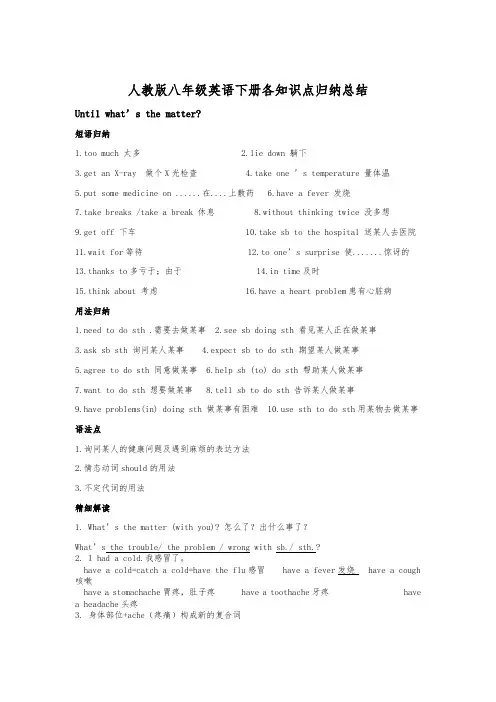
人教版八年级英语下册各知识点归纳总结Unti1 what’s the matter?短语归纳1.too much 太多2.lie down 躺下3.get an X-ray 做个X光检查4.take one ’s temperature 量体温5.put some medicine on ......在....上敷药6.have a fever 发烧7.take breaks /take a break 休息 8.without thinking twice 没多想9.get off 下车 10.take sb to the hospital 送某人去医院11.wait for等待 12.to one’s surprise 使.......惊讶的13.thanks to多亏于;由于 14.in time及时15.think about 考虑 16.have a heart problem患有心脏病用法归纳1.need to do sth .需要去做某事2.see sb doing sth 看见某人正在做某事3.ask sb sth 询问某人某事4.expect sb to do sth 期望某人做某事5.agree to do sth 同意做某事6.help sb (to) do sth 帮助某人做某事7.want to do sth 想要做某事 8.tell sb to do sth 告诉某人做某事9.have problems(in) doing sth 做某事有困难 e sth to do sth用某物去做某事语法点1.询问某人的健康问题及遇到麻烦的表达方法2.情态动词should的用法3.不定代词的用法精细解读1. What’s the matter (with you)? 怎么了?出什么事了?What’s the trouble/ the problem / wrong with sb./ sth.?2. I had a cold.我感冒了。

Unit 1 What’s the matter?一、重点短语1. have a fever 发烧2. have a cough 咳嗽3. have a toothache 牙疼4. talk too much 说得太多5. drink enough water 喝足够的水6. have a cold 受凉;感冒7. have a stomachache 胃疼8. have a sore back 背疼9. have a sore throat 喉咙痛10. lie down and rest躺下来休息11. hot tea with honey加蜂蜜的热茶12. see a dentist看牙医13. get an X-ray拍X光片14. take one’ s temperature量体温15. put some medicine on sth在……上面敷药16. feel very hot 感到很热17. sound like 听起来像18. all weekend 整个周末19. in the same way以同样的方式20. go to a doctor 看医生21. go along 沿着……走22. on the side of the road 在马路边23. shout for help 大声呼救24. without thinking twice 没有多想25. get off 下车26. have a heart problem 有心脏病27. to one’ s surprise 使……惊讶的28. thanks to 多亏了;由于29. in time及时30. save a life 挽救生命31. get into trouble 造成麻烦32. right away 立刻;马上33. because of 由于34. get out of 离开35. hurt oneself 受伤36. put a bandage on sth. 用绷带包扎37. fall down 摔倒38. feel sick 感到恶心39. have a nosebleed 流鼻血40. cut his knee割伤他的膝盖41. put her head back 把她的头向后仰42.have problems breathing呼吸困难43. mountain climbing登山运动44. be used to doing sth. 习惯做某事45. run out (of) 用完;用尽46. so that 以便47. so…that 如此……以至于……48. be in control of 掌管;管理49. in a difficult situation 在逆境屮50. keep on doing sth.坚持做某事51. make a decision做出决定52. take risks 冒险53. give up 放弃二、知识点解析1. What’s the matter? 怎么了?若是询问“某人怎么了?”要用“What’s the matter with sb.?”拓展:What’s the matter with sb.? 的同义句:What’s wrong with sb.? / What’s the trouble with sb.?2.疾病类短语:have a +疾病. e.g. :have a fever 发烧have a cold 感冒have a cough 咳嗽.have a +身体部位-ache. e.g.: have a headache 头痛have a toothache 牙痛.have a sore+身体部位. e.g.: have a sore throat咽喉痛have a sore back背痛例题:Mom, I____________.I’m sorry to hear that, dear. We must go to see the dentist right away.A. have a headacheB. have a stomachacheC. have a toothacheD. have a fever3. lie down 躺下V. 躺,平躺。
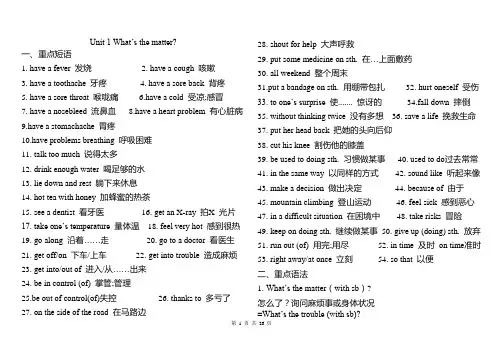
Unit 1 What’s the matter?一、重点短语1. have a fever 发烧2. have a cough 咳嗽3. have a toothache 牙疼4. have a sore back 背疼5. have a sore throat 喉咙痛6.have a cold 受凉;感冒7. have a nosebleed 流鼻血8.have a heart problem 有心脏病9.have a stomachache 胃疼10.have problems breathing 呼吸困难11. talk too much 说得太多12. drink enough water 喝足够的水13. lie down and rest 躺下来休息14. hot tea with honey 加蜂蜜的热茶15. see a dentist 看牙医16. get an X-ray 拍X 光片17. take one’s temperature 量体温18. feel very hot 感到很热19. go along 沿着……走20. go to a doctor 看医生21. get off/on 下车/上车22. get into trouble 造成麻烦23. get into/out of 进入/从……出来24. be in control (of) 掌管;管理25.be out of control(of)失控26. thanks to 多亏了27. on the side of the road 在马路边28. shout for help 大声呼救29. put some medicine on sth. 在…上面敷药30. all weekend 整个周末31.put a bandage on sth. 用绷带包扎32. hurt oneself 受伤33. to one’s surprise 使....... 惊讶的34.fall down 摔倒35. without thinking twice 没有多想36. save a life 挽救生命37. put her head back 把她的头向后仰38. cut his knee 割伤他的膝盖39. be used to doing sth. 习惯做某事40. used to do过去常常41. in the same way 以同样的方式42. sound like 听起来像43. make a decision 做出决定44. because of 由于45. mountain climbing 登山运动46. feel sick 感到恶心47. in a difficult situation 在困境中48. take risks 冒险49. keep on doing sth. 继续做某事50. give up (doing) sth. 放弃51. run out (of) 用完;用尽52. in time 及时on time准时53. right away/at once 立刻54. so that 以便二、重点语法1.What’s th e matter(with sb)?怎么了?询问麻烦事或身体状况=What’s the trouble (with sb)?=What’s the problem (with sb)?=What’s up?=What’s your trouble/problem?2.1.) have a+名词,表示某种病have a cough咳嗽2.)sore也可表疾病have a sore back/throat背疼/喉咙痛3. need有两种词性,实义动词和情态动词实义动词:1. need sth 2. need (sb) to do 3. don’t need.....情态动词:1. need+原型2. Need I ....? 肯Yes,you must. 否No, you needn’t.4.see sb do sth看见某人做某事(强调全过程)see sb doing sth看见某人正在做某事(强调正在发生)5.expect sth期待某物agree with sb同意某人expect(sb) to do 期待做某事agree to do同意做某事expect+that从句期待agree+that从句6.have trouble/problems in doing sth 做某事有困难7.trouble用法:1).be in trouble处于困境2).get(sb) into trouble(使某人)陷入困境8.词组辨析:used to do过去常常be used to doing习惯于做9.so...that+从句如此...以至于so that为了,目的是引导目的状语从句(当主句主语与从句主语一致时可用in order to)Eg: He works hard so that he can succeed=He works hard in order to succeed.10.What’s the meaning of...?=What does...mean?....的意思是什么?11.反身代词:myself, yourself, himself, herself, itself, ourselves, yourselves, themselvesteach oneself,enjoy oneself,dress oneself,introduce oneself,help oneself12.躺:lie-lay-lain-lying 说谎:lie-lied-lied-lying下蛋:lay-laid-laid-laying(规则的撒谎,不规则的躺,躺过就下蛋)Unit 2 I ’ll help to clean up the city parks.一、重点短语1. Clean-Up Day 清洁日2. an old people’s home 养老院3. help out with sth. 帮助解决困难4. used to do sth.过去常常做某事5. care for 关心;照顾6. the look of joy 快乐的表情7. at the age of 在......岁时8. clean up 打扫(或清除)干净9. cheer up (使)变得更高兴;振奋10. give out 分发;散发11. come up with 想出;提出12. make a plan 制订计划13. make some notices 做些公告牌14. try out 试用;试行15. work for 为…工作;为…. 效力16. put up 建造;举起;张贴17. hand out 分发;散发;发给18. call up 打电话;召集19. put off 推迟;延迟20. for example 比如;例如21. raise money 筹钱;募捐22. take after 与......相像;像23. give away 赠送;捐赠24. fix up 修理;修补;解决25. be similar to 与……相似26. set up 建立;设立27. disabled people 残疾人28. make a difference 影响;有作用29. be able to 能够30. after-school reading program课外阅读项目31.a feeling of satisfaction满足感32.several hours若干小时33.volunteer to do自愿做34.sick kids生病的孩子35.homeless people无家可归的人36.be busy with sth忙于37.disabled people残疾人38.a trained dog一只受过训的狗39.book lover爱书者40.think up想出二、重点语法1. notice sb do sth注意到某人做过某事,notice sb doing sth注意到某人正在做某事3.satisfaction用法:1.)satisfy v. satisfy sb 使某人满意2.)satisfied/satisfying adj. be satisfied with对...满意3.)satisfaction n. to one’s satisfaction令某人满意4.owner用法:1.)the owner of...的主人the owner of the shop 2.)one’s own+名词my own shop5. sick adj. 定语,表语sickness n.ill adj. 表语illness n. He is ill.=He is sick. Here is a sick dog.5.raise 及物动词rise 不及物动词The sun rises. Raise your hands.6.take after像(品质,外貌)look like像(外貌)7.imagine+动名词/名词/代词imagine sb doing8.have trouble/problems/difficulty in doing做某事有困难He has trouble in learning English.9.形容词+ness变名词:kind-kindness,ill-illness,sick- sickness, sad-sadness,happy-happiness,busy-business,fair-fairness10.句型辨析:It is clever/smart/kind/nice/friendly of sb to 某人做某事是...的It is +adj+for sb to do 做某事对某人来说是...的11.change one’s mind改变主意change green into yellow由绿变黄12.be interested in=have an interest in 对...感兴趣Unit 3 Could you please clean your room?一、重点短语1.go out for dinner 出去吃饭2. stay out late 在外面待到很晚3. go to the movies 看电影4. take sb. for a walk 带某人去散步5.all day/evening 整曰/夜6.do housework 做家务7. get a ride 搭车8. work on 从事9. finish doing sth. 完成做某事10. clean and tidy 干净整洁11. do the dishes 洗餐具12. take out the rubbish 倒垃圾13. fold the clothes 叠衣服14. sweep the floor 扫地15. make the bed 整理床铺16. as a result结果17. help out 帮忙18. get good grades取得好成绩19. throw down 扔下20.as soon as=the minute 一...就...21. come over 过来22.shout back 大声回应23.walk away 走开24.all the time 一直;总是25.share the housework 分担家务26. a comfortable home 一个舒适的家27.in surprise 惊讶地28. get something to drink 拿点喝的东西29.hang out 闲逛30. watch one show 观看一个节目31. pass sb. sth. 把某物传给某人32. lend sb. sth. 把某物借给某人33. get sth. wet 使某物弄湿34. hate to do sth. 讨厌做某事35. do chores 做杂务36. help sb. (to ) do /with sth 帮助某人干某事37.bring a tent带顶帐篷来38. buy some snacks买些小吃39. go to the store去商店40. invite sb. to a party邀请某人参加聚会41. make sb. do sth. 使某人做某事42. enough stress足够的压力43.a waste of time浪费时间44. in order to为了45. provide sb with sth=provide sth for sb46. mind doing sth. 介意做某事47. depend on依赖;依靠48. look after/take care of 照顾;照看49. develop children’s independence发展孩子的独立性50. do one’s part in (doing ) sth.做某人分内的事51. come home from school/ work放学/下班回家二、重点语法1.Could you please(not) do sth ?用于提出请求,希望得到对方肯定回答,语气较委婉。
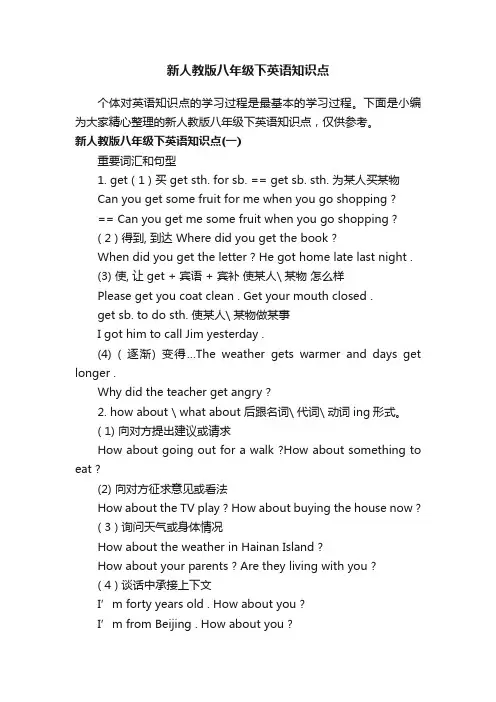
新人教版八年级下英语知识点个体对英语知识点的学习过程是最基本的学习过程。
下面是小编为大家精心整理的新人教版八年级下英语知识点,仅供参考。
新人教版八年级下英语知识点(一)重要词汇和句型1. get ( 1 ) 买 get sth. for sb. == get sb. sth. 为某人买某物Can you get some fruit for me when you go shopping ?== Can you get me some fruit when you go shopping ?( 2 ) 得到, 到达 Where did you get the book ?When did you get the letter ? He got home late last night .(3) 使, 让 get + 宾语 + 宾补使某人\ 某物怎么样Please get you coat clean . Get your mouth closed .get sb. to do sth. 使某人\ 某物做某事I got him to call Jim yesterday .(4) ( 逐渐) 变得…The weather gets warmer and days get longer .Why did the teacher get angry ?2. how about \ what about 后跟名词\ 代词\ 动词ing形式。
( 1) 向对方提出建议或请求How about going out for a walk ?How about something to eat ?(2) 向对方征求意见或看法How about the TV play ? How about buying the house now ?( 3 ) 询问天气或身体情况How about the weather in Hainan Island ?How about your parents ? Are they living with you ?( 4 ) 谈话中承接上下文I’m forty years old . How about you ?I’m from Beijing . How about you ?3. receive 收到 The girl was happy to receive many gifts on her birthday .receive a letter from == get a letter from == heard from收到某人的信I received a letter from my parents last Sunday .== I got a letter from my parents last Sunday .== I heard from my parents last Sunday .accept 接受He couldn’t accept our suggestions but our gifts .She was very glad to receive the invitation .He didn’t receive a good education at university .I received an invitation to the party , but I refused to accept it .4. a 6--year – old child 一个六岁的孩子6--year – old 是由“数词 +名词 + 形容词” 构成的复合形容词, 作前置定语,修饰后面的名词child .数词+名词+形容词构成的复合形容词,中间的名词要用单数形式:a five-year-old girl 一个五岁的女孩a six-foot-deep hole 一个六英尺深的洞a two-meter-long ruler 一把两米长的尺子 a 100-meter race一场百米赛跑a ten-story-high building 一栋十层高的楼房a two-inch-thick dictionary一本两英寸厚的词典5. too … to… 太…… 而不能……too 后跟形容词或副词原形, to 后跟动词原形, 构成不定式. 句子的主语与动词不定的主语不一时, 可以在动词不定式前加逻辑主语for sb.He is too young to join the army ( 军队) .The maths problem is too difficult for me to work out .表示否定意义的never \ not 和too … to… 连用时表达肯定一样.One is never too old to learn .too … to… 可以与 enough to 和so… that … 转换.与enough to转换时, enough 前的形容词, 副词必须是too 后面形容词,副词的反义词, 并使用其否定句式.She is too young to do the work .== she isn’t old enough to do the work .与so… that … 转换时, that 后面的从句要用否定形式.Tom is too tired to walk any farther .== Tom is so tired that he can’t walk any farther .6. cost 1) 动词 , 花费 \ 价值 (多少钱 )How much did it cost ?I didn’t buy it because it cost too much .The meal cost us about 100 yuan .(2 ) 名词 , 成本, 费用, 价钱. at all costs不惜任何代价; at the costof 以…… 为代价.Living costs are higher in cities than that in the country .We must stop it at all costs .After the earthquake , the soldiers tried to reach the area at thecost of their lives .7. pay , spend , cost , take 的区别pay 花费 ( 多少钱 ) , 主语是人. Sb. pay some money for sth.I paid 5000 yuan for the computer last week .Spend 花费 ( 多少钱或时间 ),主语是人. Sb. spend some money on sth.Sb. spend some time ( in ) doing sth.I spent 5000 yuan on the computer last week .She spent 2 hours ( in ) doing her homework .cost 花费 ( 多少钱 ) , 主语是物. Sth. cost sb. some money .This jacket cost him 200 dollars .take 花费 (时间 ),It takes sb. some time to do sth .花费某人多少时间做某事How long does it take sb. to do sth ?花费某人多少时间做某事?It took Liu Hong 2 hours to do her homework .It takes me 10 minutes to walk to school from home .It will take them 6 months to build the building .How long does it take him to plant the trees ?8. sleep , sleeping, sleepy , asleep , fall asleep , be asleepsleep 动词, 睡觉, 强调动作. I am very tired . I want to sleep .He slept for 12 hours yesterday .sleeping , Sleep 的现在分词, 表示“ 正在睡觉”Don’t make so much noise . The baby is sleeping .They woke up the sleeping girl and asked her where her parents were .sleepy 想睡觉的, 困倦的. I am a little sleepy . I’d like to go to bed .asleep 睡着了的.The teacher found Tom asleep in class and kept him behind after school .Would you mind turning down the TV ? The baby is asleep .fall asleep 强调从没有睡着到睡着的过程, 不能接一段时间I couldn’t fall asleep until it was very late last night .He listened to music and fell asleep .be asleep 表示睡着后的状态, “ 睡着了”, 可以接一段时间 .He was asleep for three hours .9. choose 动词, “ 选择,挑选” , 过去式chose, 过去分词chosenchoose to do sth. 选择做某事can’t Choose but 只得……pick and choose 挑挑拣拣There are many books to choose from .We choose mike as our leader ( 领导 ).Will you help me choose a dictionary ?Everyone can’t choose but obey ( 服从 ) .It’s her habit (习惯 ) to pick and choose while shopping .10. present (1) 礼物, 礼品 == gift Why not give him a card asa present ?what can I get him for a birthday present ?( 2 ) 目前, 现在I’m sorry he is out at present .You have to forget the past and start living in the present .11. open ( 1 ) 动词, 打开 , 开业, 开张, 展现I t’s not right to open other people’s letters .Would you mind opening the window ?The door opens to the south .This factory opened in 1998.( 2 ) 形容词, be open 开着的, 开放的In his dream the flowers are all open .Most shops are closed but several are still open .On weekends the swimming pool is open to the public .close 动词, 关闭, 关上 , 合上Please close the door to keep the cold out .closed 形容词, be closed 关着的, 关闭的when we got to the shop it was closed .12 . give away 赠送 , 分发 give away sth to sbAunt Wang gave away the candies (糖果 ) to the kids .John gave away his notebook to me .其它短语 give up 放弃 give back 归还 give off 放出, 发出(气味) give sth to sb == give sb. sth . 把某物给某人13. rather than 而不是…… 后面跟名词, 代词, 从句The color seems green rather than blue .If you ran rather than walked , you would have arrived earlier .We depend on you rather than on him .You should help them rather than they should help you .prefer to do sth rather than do sth . 宁愿…… , 也不……She preferred to stay at home rather than go with us .He preferred to listen to music rather than play games .Would rather do sth than do sth . 宁愿…… , 也不……He would rather play than work .I would rather take the slowest train than go there by air .14. instead (1) 位于句首, 表示“ 反而, 相反”I didn’t go to the cinema last night . instead, I watched a football match on TV.The boy didn’t sing to the music . Instead , he sang his own way .( 2 ) 位于句尾, 表示“ 作为代替, 而是”Mr smith was ill , so mr green was taking his class instead .I don’t like this one , please give me that inst ead .instead of 后跟名词, 代词, 动名词, 介词短语.表示“ 代替, 而不是”I have come instead of my brother . He is ill .We walked down the stairs instead of taking the elevator ( 电梯 ) .He studies in the evening instead of during the day .15. enter (1) 参加 == take part in \ joinMore than one thousand sportsmen entered \ took part in the games .My brother hopes to enter \ join the army next year .( 2 ) 进入 ==come into \ go intoShe entered\ came into the room with these words .Did you see someone enter \ go into the house ?16. encourage 动词, 鼓励, 激励 encourage sb. to do sth.鼓励某人做某事Parents should encourage children to do things by themselves .Our English teacher encourages us to keep a dairy in English .17. progress 名词, “ 进步, 进展” make progress “取得进步, 取得进展”My parents are pleased with my progress in lessons .Tom is now making much \ great progress at school .They made no progress in the heavy snow .18. suggest 动词, 建议, 提议. 后跟名词, 代词, 动名词和从句she suggested a way out of the difficulty .he suggested going home .who suggested you staying here ?I suggested we ( should ) hold a meeting .19. take an interest in ( doing ) sth. 对 ( 做 )某事感兴趣否定表达是 take no interest in ( doing ) sth. 对 ( 做 )某事不感兴趣Do you take an interest in English ?Most children take an interest in playing computer games .He takes no interest in playing basketball .be \ become interested in ( doing ) sth对 ( 做 )某事感兴趣I’m deeply interested in swimming .She became interested in singing when she was only 7 years old .20. Three good ways of improving English are mentioned .提到了三种提高英语的好方法.of improving English是介词短语作定语修饰ways . 它相当与动词不定式.Three good ways of improving English are mentioned .=== Three good ways to improve English are mentioned .Can you find a way to work out the problem ?==Can you find a way of working out the problem ?Fast is another way of saying quick .== Fast is another way to say quick .Mention (1) 动词, “ 提到, 提及, 说起”as mentioned above 如上所述He often mentioned his past to me .Nobody mentioned anything to me about it .Did she mention where she was going ?You mentioned in your letter that you might be moving abroad .As mentioned above , there are many good ways to learn English well .( 2 ) 名词, “ 提及, 说起”The newspaper made no mention of him .21. make friends with sb. 和某人交朋友Would you like to make friends with us ?I find it difficult to make friends with Ben .新人教版八年级下英语知识点(二)形容词、副词一、形容词(一)形容词的含义:表示人或事物的特征、性质、状态的词叫形容词。
八年级下册英语基础知识归纳(一)Unit 1 What’s the matter?【短语归纳】1. 太多too much2. 躺下lie down3. 量体温take one’s temperature4. 看牙医see a dentist5. 做个X光检查get an X-ray6. 在……上敷药put some medicine on…7. 发烧have a fever 8. 整个周末all weekend 9. 玩电脑游戏play computer games10. 下车get off 11. 看医生go to a doctor 12. 送某人去医院take sb. to the hospital13. 到达get to 14. 立刻; 马上right away 15. 休息take breaks/take a break16. 等待wait for 17. 多亏;由于thanks to 18. 没多想without thinking twice19. 及时in time 20. 考虑think about 21. 使…….惊讶的to one’s surprise…22. 摔倒fall down 23. 踢足球play soccer 24. 患有心脏病have a heart problem25. 几个;少数a few 26. 造成麻烦get into trouble 27. 做正确的事do the right things28. 进来come in 29. 对…感兴趣be interested in 30. 被打击/晒伤get hit/sunburned31. 习惯于be used to 32. 冒险take risks/ take a risk 33. 把……放在某物上put… on sth.34. 因为because of 35. 失去生命lose one’s life 36. 用完; 耗尽run out (of)37. 切除cut off 38. 离开;从……出来get out of 39. 做决定make adecision/decisions40. 放弃give up 41. 掌管; 管理be in control of 42. 去爬山go mountain climbing【用法集萃】1. 需要去做某事need to do sth.2. 看见某人正在做某事see sb. doing sth.3. 询问某人某事ask sb. sth.4. 期望某人做某事expect sb. to do sth.5. 同意做某事agree to do. sth.6. 帮助某人做某事help sb. (to) do sth.7. 想要做某事want to do sth. 8. 告诉某人去做某事tell sb. to do sth.9. 做某事有困难have problems (in) doing sth. 10.习惯于做某事be/get used to doing sth.11. 用某物去做某事use sth. to do sth. 12. 好像做某事seem to do sth.13. 继续做某事keep on doing sth. 14. 介意做某事mind doing sth.Unit 2 I’ll help to clean up the city parks.【短语归纳】1. 分发give out2. 打扫(或清除)干净clean up3. (使)变得更高兴;振奋起来cheer up4. 建起;设立set up5. 赠送;捐赠give away6. 曾经……; 过去…… used to7. 推迟put off 8. 想出come up with 9. 影响; 有作用make a difference10. 张贴put up 11. 打电话给call up 12. 帮助…….摆脱困难help out13. 实现come true 14. 照顾; 照看care for 15. 参加选拔try out for16. 修理fix up 17. 用光run out of 18. 与……相像take after 19. 与……相似be similar to【用法集萃】1. 制订计划做某事make plans to do sth.2. 要求某人(不要)做某事ask sb. (not) to do sth.3. 过去常常做某事used to do sth.4. 决定做某事decide to do sth.5. 有……感觉get a feeling of…6. 对……产生影响make a difference to7. 自愿花时间某事volunteer one’s time to do sth. 8. 放弃时间去做某事give up +时间+ to do sth.9 使得做某事对某人来说是可能的make it possible for sb. to do sth.Unit 3 Could you please clean your room?【短语归纳】1. 洗餐具do the dishes2. 扫地sweep the floor3. 倒垃圾take out the rubbish4. 整理床铺make the bed5. 叠衣服fold the clothes6. 打扫起居室clean the living room5. 搭车get a ride6. 去看电影go to the movies7. 出去吃晚饭go out for dinner8. 至少at least 9. 在外待得晚stay out late 10.帮助做完某事help out (with sth.)11. 扔下throw down 12. 随时any minute now 13.一直;频繁;反复all the time14. 过来come over 15. 一……就…… as soon as 16. 带狗去遛遛take the dog fora walk17.惊讶地in surprise 18. 和……一样as… as 19. 在….上花费(时间或金钱)spend… on20. 为了in order to 21. 依赖; 信赖depend on 22. 向某人提供某物provide sth. for sb.23. 照顾;照看look after 24. 照顾take care of 25. 结果as a result26. 进入get into 27. 保持它干净、整洁keep it clean and tidy【用法集萃】1. 做完某事finishing doing sth.2. 想要某人做某事want sb. to do sth.3. 尽力(不)做某事try (not) to do sth.4. 让某人做某事let sb. do sth.5. 介意做某事mind doing sth.6. 花费……做某事spend… in doing sth.7. 学会做某事learn to do sth. 8. 学会怎样做某事learn how to do sth.9. 越……., 就越……. the + 比较级, the + 比较级Unit 4 Why don’t you talk to your parents?【短语归纳】1. 太多(不可数n.) too much2. 太多(可数名词n.) too many3. 得到充足睡眠get enough sleep4. 闲逛hang out with sb.5. 争吵get into a fight6. 早点儿去睡go to sleep earlier7. 谈论talk about sth. 8. 擅长be good at (doing) sth. 9. 给某人打电话call sb. up10. 归还give back 11. 在电话中on the phone 12. 浏览; 翻阅; 仔细检查look through13. 没问题no problem 14. 重要的事情a big deal 15. 生某人的气be angry with sb.16. 解决; 算出work out 17. 感到孤独feel lonely 18. 与某人和睦相处get on with sb.19. 下次next time 20. 今后;从今以后in future 21. 与某人交流communicate with sb.22. 交朋友make friends 23. 害怕……. be afraid of 24. 在……的前面in front of25. 做运动do sports 26. 不再…….not… any more 27. 与某人竞争compete with sb.28. 那么多so much/many 29. 上课have lessons 30. 去购物go shopping31. 删除; 删去cut out 32. 各种各样的all kinds of 33. 比较; 对比compare…with…34. 几个; 少数a few 35. 同意某人agree with sb. 36. 依………看in one’s opinion37. 调小turn down 38. 一些安静的事something quiet【用法集萃】1. 允许某人做某事allow sb. to do sth.2. 你什么不做某事呢? Why don’t you do sth.?3. 发现某人在做某事find sb. doing sth.4. 拒绝做某事refuse to do sth.5. 让某人做某事let sb. do sth.6. 主动提出做某事offer to do sth.7. 介意某人做某事mind sb. doing sth. 8. 直到…….才…….. not… until….9. 该做某事了。
八年级英语第一单元知识点归纳1. be scared of sb./sth. 恐惧某人/某物2. go up 上升,与rise 同义,与go down 或set 相反3. make a noise 发出声响,吵闹4. arrive in 到达,表示到达某一城市、国家等大地方时,用介词in;表示到达某一村庄、车站等小地方时,用介词at ;到达的地方用副词表示时,可不用介词。
5. not…until…直到……才……6. see…doing…停止做某事7. go cycling 相当于 go to ride a bike ,意思是去骑车。
8. nit sb. on the head 表示“打某人的头”,表示的“打某人的脸”要用hit sb. in the face 。
9. turn around 转身10. fall off 摔下来11. give sb. a push 推某人一下12. help sb. do sth. = help sb. with sth. 帮助某人做某事13. get off 从……下来,通常指下火车、巴士、轮船、飞机等。
14. think about 思考、想起、想到(某人或某事)15. all day 一整天16. one by one 一个接一个地,类似有year by year 一年又一年;day by day 一天又一天。
八年级英语第二单元知识点归纳1. grow into 长成……2. pass sb. sh. = pass sth. to sb. 递给某人某物3. billions of 数十亿的,hundred, thousand, million , billion等词前面有具体数字时,其本身用单数形式,直接修饰名词;表示一个笼统的概念时,这些词用复数形式,而且常与介词of连用修饰名词。
4. look after = take care of 照顾,照料。
5. be full of 满,充满=be filled with6. be made of/from由……制成,be made of 表示在制成的过程中,原材料没有发生质的变化;be made from 表示在制成的过程中,原材料发生质的变化。
人教版英语八年级下册知识点总结一、语法知识点1. 时态:掌握一般现在时、一般过去时、一般将来时、现在进行时、过去进行时、过去将来时等时态的用法。
2. 过去进行时:用于表示过去某一时间正在进行的动作或状态。
3. 以下代词和副词的用法:- somebody, anybody, nobody, everybody 可用作主语或宾语。
- something, anything, nothing, everything 可用作主语或宾语。
- somewhere, anywhere, nowhere, everywhere 可用作地点副词。
4. 句型:掌握各种基本句型,如祈使句、选择疑问句、反义疑问句等。
5. 状语从句:掌握时间、原因、结果、条件等类型的状语从句的用法,并注意从句的引导词。
6. 定语从句:研究使用关系代词 who, whom, whose, which, that 引导定语从句,并了解先行词和关系词在从句中的作用关系。
二、词汇知识点1. 词汇拼写和用法:巩固和扩大基础词汇量,掌握词汇的正确拼写和用法。
2. 同义词和反义词:研究常用的同义词和反义词,提高词汇表达的能力。
3. 词组和固定搭配:掌握常用的词组和固定搭配,能够灵活运用。
三、阅读知识点1. 阅读理解:提高阅读理解能力,掌握快速获取信息的技巧。
2. 阅读策略:研究使用各种阅读策略,如扫读、略读、详读、推断等。
3. 阅读技巧:培养良好的阅读惯和技巧,如划重点、标记陌生单词等。
四、写作知识点1. 写作结构和组织:研究写作时合理安排文章结构和组织思路,使内容连贯。
2. 信息衔接和过渡:掌握信息衔接和过渡的方法,使文章各部分之间有逻辑性。
3. 词汇和句型运用:运用丰富的词汇和多样的句型,提高写作表达的准确性和流畅性。
以上为人教版英语八年级下册的主要知识点总结,希望能帮到你!。
八年级英语下册语法知识复习1.should 情态动词,应该,应当,用于询问,提出建议,或表达职责和义务。
如:What should I do? You should have a talk with your parents。
could 也可以提出建议,比较委婉.如: You could write him a letter。
could还用于礼貌地请求,如:Could you please clean your room? 否定句式:Could you please not do sth?其他常用情态动词:must必须,have to必须,不得不,may可能,可以,can能,会,可能,可以need需要。
情态动词+动词原形作谓语。
2.非谓语动词形式(一)动词不定式结构:to+动词原形或不带to。
否定:not+to do或not do句法功能:1)主语:常用it作形式主语,不定式为真正的主语:It is +形容词+for sb。
to do sth.It is important to keep fit。
=To keep fit is important.2)宾语:(1)直接宾语:想,喜欢,希望:want,like, love,would like,hope, expect;决定同意拒绝开始学习:decide,agree, refuse, begin,start, learn, 需要计划帮助提供:need, plan,help,offer+ to do(划线的动词还可以接doing)如:I’ll help to clean up the city parks。
(宾语)疑问词(what, who, which,where, when ,how,)+to do 作宾语I don’t know what to say. 我不知道说什么。
(2)宾补:tell,ask,want,wish,allow,invite,help,encourage,teach等+ sb. to do (hope不能接sb。
Unit1 What’s the matter?【重点单词】matter [ˈmætə] v. 重要,要紧,有关系What’s the matter? 怎么了?出什么事了?sore [sɔ:(r)] adj. 疼痛的,酸痛的have a cold 感冒stomach ['stʌmək] n. 胃,腹部stomachache ['stʌməkeɪk] n. 胃痛,腹痛have a stomachache 胃痛foot(复数feet) [fu:t] n. 脚neck [nek] n. 颈,脖子throat [θrəʊt] n. 喉咙fever ['fi:və] n. 发烧,发热lie [laɪ] v. 躺,平躺lie down 躺下rest [rest] n. 剩余部分,其余;放松,休息cough [kɒf] n. & v. 咳嗽X-ray ['eksreɪ] n. X光,X射线toothache [ˈtu:θeɪk] n. 牙痛take one's temperature 量体温headache [ˈhedeɪk] n. 头痛have a fever 发烧break [breɪk] n. & v. 休息,暂停;打破take breaks (take a break)休息hurt [hə:t] v. 伤害,损害,使受伤passenger ['pæsɪndʒə] n. 乘客,旅客off [ɒf] adv. prep. 离开(某处);从…去掉get off 下车to one's surprise 使…惊讶,出乎…意料onto [ˈɒntə] prep. 向,朝trouble [ˈtrʌbl] n. 麻烦,烦扰,问题hit [hit] n. & v. 碰撞,打,打击right away 立即,马上get into 陷入,参与herself [hə:ˈself] pron. 她自己,她本身(she的反身代词)bandage ['bændɪdʒ] n. & v. 绷带;用绷带包扎sick [sɪk] adj. 患病的,不适的knee [ni:] n. 膝盖nosebleed [ˈnəʊzbli:d] n. 鼻出血breathe [bri:ð] v. 呼吸sunburned [ˈsʌnbɜ:nd] adj. 晒伤的ourselves [ɑ:ˈselvz] pron. 我们自己(we的反身代词)climber [ˈklaɪmə(r)] n. 登山者be used to 习惯于… 适应于…risk [rɪsk] n. & v. 风险,危险;冒险take risks (take a risk) 冒险accident [ˈæksidənt] n. 意外事件;事故situation [ˌsitjuˈeiʃən] n. 状况,形式,情况kg=kilogram [ˈkɪləgræm] n. 公斤,千克rock [rɔk] n. 岩石run out (of) 用尽,耗尽knife [naif] n. 刀,餐刀cut off 切除blood [blʌd] n. 血mean [mi:n] v. 意味着,意思是,意欲get out of 离开,从… 出来importance [ɪmˈpɔ:tns] n. 重要性decision [dɪ'sɪʒn] n. 决心,决定,抉择control [kən'trəʊl] v. 控制,支配,操纵be in control of 掌管,管理spirit ['spɪrɪt] n. 勇气,意志death [deθ] n. 死亡give up 放弃nurse [nə:s] n. 护士【重点短语】1.have a fever 发烧2.have a cough 咳嗽3.have a toothache 牙疼4.talk too much 说得太多5.drink enough water 喝足够的水6.have a cold 受凉;感冒7.have a stomachache 胃疼8.have a sore back 背疼9.have a sore throat 喉咙痛10. take risks 冒险11.hot tea with honey 加蜂蜜的热茶12.see a dentist 看牙医13.get an X-ray 拍X 光片14.take one’ s temperature 量体温15.put some medicine on sth. 在……上面敷药16. give up 放弃17. sound like 听起来像18. all weekend 整个周末19. in the same way 以同样的方式20. go to a doctor 看医生21. go along 沿着……走22. on the side of the road 在马路边23. shout for help 大声呼救24. without thinking twice 没有多想25. get off 下车26. have a heart problem 有心脏病27. to one’ s surprise 另某人惊讶的是28. thanks to 多亏了;由于29. in time 及时30. make a decision 做出决定31. get into trouble 造成麻烦32. right away 立刻;马上33. because of 由于34. get out of 离开;从……出来35. keep on doing sth. 继续或坚持做某事36. put a bandage on sth. 用绷带包扎37. fall down 摔倒38. feel sick 感到恶心39. have a nosebleed 流鼻血40. cut his knee 割伤他的膝盖41. put her head back 把她的头向后仰42. have problems breathing 呼吸困难43. mountain climbing 登山运动44. be used to doing sth. 习惯做某事45. run out (of) 用完;用尽46. so that 以便47. so...that... 如此……以至于...…48. be in control of 掌管;管理49. in a difficult situation 在闲境中【重点句型】1. What's the matter with you?= What'the trouble with you?= What's wrong with you? 你怎么了?2. What should she do? 她该怎么办呢?3.Should I take my temperature? 我应该量一下体温吗?4.You should lie down and rest. 你应该躺下休息一会儿。
八年级英语下册重点语法点归纳1.形容词/副词的比较级和最高级1.形容词/副词的比较级和最高级的构成规则(1)单音节词和少数以-er,-ow结尾的双音节单词,比较级在后面加-er,最高级在后面加-est。
①单音节单词small→smaller→smallestshort→shorter→shortesttall→taller→tallestgreat→greater→greatest②少数以-er,-ow结尾的双音节单词clever→cleverer→cleverestnarrow→narrower→narrowest(2)以不发音e结尾的单音节单词,比较级在原形后加-r,最高级在原级后加-st。
large→larger→largestnice→nicer→nicestable→abler→ablest(3)以一个辅音字母结尾的闭音节(即:辅音+元音+辅音)单词中,先双写末尾的辅音字母,比较级加-er,最高级加-est。
big→bigger→biggesthot→hotter→hottestfat→fatter→fattest(4)以“辅音字母+y”结尾的双音节词,把y改为i,比较级加-er,最高级加-est。
easy→easier→easiestheavy→heavier→heaviestbusy→busier→busiesthappy→happier→happiest(5)其他双音节词和多音节词,比较级在前面加more,最高级在前面加most。
beautiful→more beautiful→most beautifuldifferent→more different→most differenteasily→more easily→most easily(6)有少数形容词、副词的比较级和最高级是不规则的,必须熟记。
good→better→bestwell→better→bestbad→worse→worstill→worse→worstold→older/elder→oldest/eldestmany/much→more→mostlittle→less→leastfar →further/farther→ furthest/farthest2.形容词和副词比较级的用法(1)“甲+be+(倍数)+形容词比较级+than+乙”表示“甲比乙…”或“甲比乙…几倍”。
最新人教版八年级下册英语全册知识点大全Unit 1重点短语:have a stomachache have a cold lie downtake one’s temperature have a fever go to a doctorto one’s surprise agree to (do sth.)get into troublebe used to take risks run out (of)cut off get out of be in control ofkeep on ( doing sth.)give up语言知识归纳:-1. What’s the matter (with you)此句用来询问别人的病情。
类似的句子还有:What’s wrong with you/ What’s the troublematter作动词用,意为“要紧”“有关系”,主要用于疑问句和否定句。
What does it matter It doesn’t matter.【例题】Does it ________ if we can’t finish it todayA. mindB. mindsC. matterD. matters2. I have a sore throat.have “患病”,常用“have a /an+ 名词”.have a cold have a fever have a sore back(have a stomachache have a cough【例题】( )---Does he often have ______ cold ---Yes. He also _____a cough and a sore throat.A. a; hasB. /; hasC. a; haveD. /; havedown and rest! 躺下休息lie down 躺下" Array’s probably why. 那可能就是原因。
probably意为“很可能,大概”,表示的可能性很大,是一种近乎肯定的意思。
5.hurt v.使受伤;伤害;疼痛He hurt his leg when he fell. 他摔伤的时候伤了腿。
My feelings were hurt when he didn’t ask me to the party.他没有请我参加聚会使我很伤心。
6.The bus driver, 24-year-old Wang Ping...公交车司机,24岁的王平……)24-year-old 是用连字符连接数字和名词所构成的一个形容词结构,意思是“24岁的”。
(名词必须用单数,常用在名词前做定语)【例题】A____girl named DongXinyi looked after her disabled father.A. three-year-oldB. three-years-oldC. Three years old两者都有期待的意思look forward to doing sth.I’m looking forward to seeing Tom.8.But to his surprise...但是令他吃惊的是……to one’s surprise 表示“令人惊奇的是……”,相当于“主语+be+surprised”To his surprise, he found the girl was bind.》= He was surprised to find the girl was blind. 令他惊奇的是,他发现这个女孩是个盲人。
【拓展】in surprise表示“惊奇的”,相当于副词性短语,用来修饰动词。
The two girls looked at each other in surprise. 那两个女孩惊奇地互相看着。
be surprised at表示“对……感到惊讶”。
We are very surprised at the news. 听到这个消息,我们很诧异。
surprising 表示“使人惊奇的”,作表语时,主语是事物。
9.They don’t want a ny trouble. 他们不想惹麻烦。
① trouble用作名词,意为“烦恼,困难,麻烦,疾病等”。
His life is full of trouble. 他的生活充满了烦恼。
What’s the trouble 怎么了)② trouble用作动词,意为“麻烦,打扰”。
I’m sorry to trouble you. 抱歉打扰你。
【拓展】与trouble相关的短语in trouble处于困境中get into trouble陷入困境Have trouble (in) doing sth. 做某事有困难【例题】-How is your English study -Not bad. But I_____learning English grammar.A. am interestedB. am good atC. have a little troubleD. have no trouble10.辨析used to do sth. 与be used to sth. / doing sth.↓ ↓过去常常…… 习惯于某事/做某事>We used to draw pictures badly.You will get used to the weather here.In the end, I got used to doing hard work.11.辨析run out 与run out of人+ run out of They have run out of the water.物+ run out (不可用于被动语态)The money is running out.【例题】选出能代替句中画线部分的一项( ) Yesterday I used up all the salt to cook dumplings. I need to buy some now.A. ate upB. run out ofC. ran ofD. ran out of|decision为decide的名词形式make a decision to do sth. = decide to do sth.13.be in control of 管理;控制A teacher should be in control of his class.重点语法:情态动词should的用法(1)should后接动词原形,变否定句在should后加not, 变一般疑问句时将should提前。
(2)should常用于以下两种情况:①提出建议You looked tired. You should lie down and rest.②表推测,意为“该,按理应当”。
Wait a minute. I think he should come in a minute.Unit 2 I’ll help to clean up the city parks.重点短语:clean up by oneself cheer upput off give out put onused to give away take afterset up make a difference care forcome up with语言知识归纳:>1. give out 分发,发放【拓展】give构成的短语还有:give away 赠给,赠送give in 屈服,投降give up 放弃give off 发出(气味、光、热等)up with 提出,想出(1)表示“想出或提出”,相当于think ofI think she can come up with a good idea(2)come up with还可表示“赶上”,相当于catch up with.We should study hard to come up with them【例题】( ) We must _____a plan to improve your math.}A. pick upB. catch up withC. come up withD. make up3. I’v run out of it. 我已经把它用完了。
run out of 表示“用完,用光”,其主语一般是人。
【拓展】run out of 还可表示“从……跑出来”。
Bill ran out of the room. Bill从房间里跑出来。
run构成的短语还有run away 逃走run after追赶run into difficulties遇到困难【例题】( ) When your money____, please come to me for some.A. runs out ofB. runs outC. is running out ofD. is run out5.I take after my mother.我长得像我妈妈。
【辨析】take after 与look liketake after意为“长得像,行为、性格等像”,尤其是像自己的长辈。
The boy takes after his father. 这个男孩长得像他爸爸。
look like 可以用于所有场合,既可指人也可指物,仅指外表看上去像。
The man looks like our teacher. 这个男的看起来像我们的老师。
The rainbow looks like a bridge. 彩虹看上去像一座桥。
【拓展】take 构成的短语take up take off take placetake one’s time take care|【例题】( ) -You’ve really beautiful blond hair. -Thank you. I ____my mother.A. look afterB. take afterC. take fromD. look for语气。
翻译短语位at most,意为“至多,最多”。
He kept me waiting at least an hour.There were fifty people there at most.3.all the time 一直;总是Things are changing all the time.事情一直在变化。
【拓展】time相关的短语on time准时at the same time同时in time及时:From time to time偶尔the first time第一次【例题】选出能代替句中划线部分的一项。